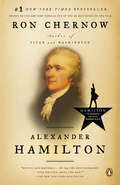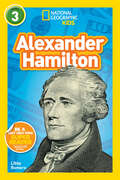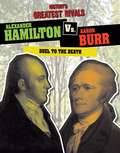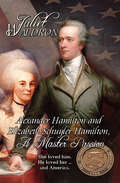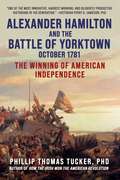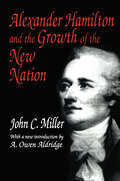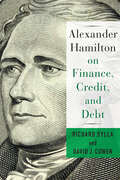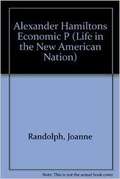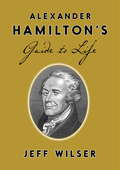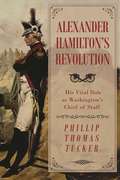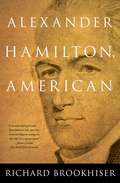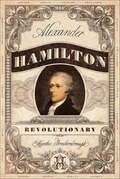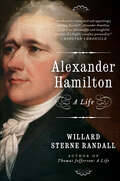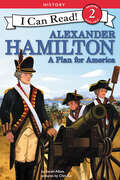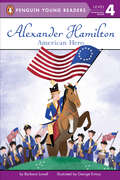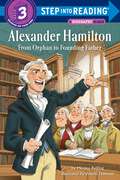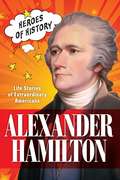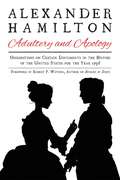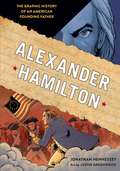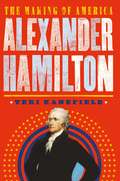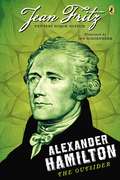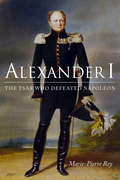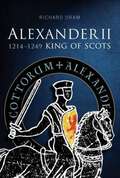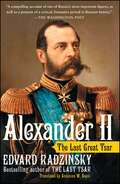- Table View
- List View
Alexander Hamilton (Great Lives Ser.)
by Ron ChernowA New York Times Bestseller, and the inspiration for the hit Broadway musical Hamilton!Pulitzer Prize-winning author Ron Chernow presents a landmark biography of Alexander Hamilton, the Founding Father who galvanized, inspired, scandalized, and shaped the newborn nation.In the first full-length biography of Alexander Hamilton in decades, Ron Chernow tells the riveting story of a man who overcame all odds to shape, inspire, and scandalize the newborn America. According to historian Joseph Ellis, Alexander Hamilton is “a robust full-length portrait, in my view the best ever written, of the most brilliant, charismatic and dangerous founder of them all.”Few figures in American history have been more hotly debated or more grossly misunderstood than Alexander Hamilton. Chernow’s biography gives Hamilton his due and sets the record straight, deftly illustrating that the political and economic greatness of today’s America is the result of Hamilton’s countless sacrifices to champion ideas that were often wildly disputed during his time. “To repudiate his legacy,” Chernow writes, “is, in many ways, to repudiate the modern world.” Chernow here recounts Hamilton’s turbulent life: an illegitimate, largely self-taught orphan from the Caribbean, he came out of nowhere to take America by storm, rising to become George Washington’s aide-de-camp in the Continental Army, coauthoring The Federalist Papers, founding the Bank of New York, leading the Federalist Party, and becoming the first Treasury Secretary of the United States.Historians have long told the story of America’s birth as the triumph of Jefferson’s democratic ideals over the aristocratic intentions of Hamilton. Chernow presents an entirely different man, whose legendary ambitions were motivated not merely by self-interest but by passionate patriotism and a stubborn will to build the foundations of American prosperity and power. His is a Hamilton far more human than we’ve encountered before—from his shame about his birth to his fiery aspirations, from his intimate relationships with childhood friends to his titanic feuds with Jefferson, Madison, Adams, Monroe, and Burr, and from his highly public affair with Maria Reynolds to his loving marriage to his loyal wife Eliza. And never before has there been a more vivid account of Hamilton’s famous and mysterious death in a duel with Aaron Burr in July of 1804.Chernow’s biography is not just a portrait of Hamilton, but the story of America’s birth seen through its most central figure. At a critical time to look back to our roots, Alexander Hamilton will remind readers of the purpose of our institutions and our heritage as Americans.“Nobody has captured Hamilton better than Chernow” —The New York Times Book Review From the Trade Paperback edition.
Alexander Hamilton (National Geographic Kids Readers)
by Libby RomeroFans of American history and the hit Broadway play are sure to enjoy the true story of Founding Father Alexander Hamilton in this Level 3 biographical Reader from National Geographic Kids.Learn all about the revolutionary life of one of America's most popular historic figures. Level 3 text provides accessible yet wide-ranging information for fluent readers. The expert-vetted text, brilliant photos, and fun approach to reading are a winning formula with kids, parents, and educators.
Alexander Hamilton Vs. Aaron Burr: Duel to the Death (History's Greatest Rivals)
by Ellis RoxburghAlexander Hamilton and Aaron Burr came from differing backgrounds, but rose to great stature in the years following the American Revolution. As Secretary to the Treasury, Hamilton tackled the fragile finances of the new nation. Burr became the third US vice president in 1800. Readers may wonder how two such prominent men wound up in a duel that ultimately took Hamilton's life and ended Burr's political career. This is the engrossing account of the incidents that led to that fateful morning in 1804. Background information of the era, a timeline, quotes, and historical paintings enhance readers' understanding of the post-revolutionary country.
Alexander Hamilton and Elizabeth Schulyer Hamilton
by Juliet WaldronAlexander Hamilton and Elizabeth Schulyer is the story of our brilliant first Secretary of the Treasury, Alexander Hamilton, and his wife, Betsy Schuyler. It begins with their Revolutionary War courtship. Although born poor and illegitimate, as an Aide de Camp to General George Washington, Hamilton dares to reach, boldly pursuing Betsy, daughter of a wealthy and prominent New York family. After the war, Hamilton engages in nation building. Like all mission-driven men, he is preoccupied, often absent, and not the best provider. The trials of making ends meet and raising their ever-growing troop of children falls to Betsy, who accomplishes her task with grace and devotion. Conflict is built into their marriage. It does not simply spring from Alexander's agonizing childhood experience of bastardy, abuse, and abandonment. To quote Alexander Pope, Hamilton's favorite poet: “And hence one Master Passion in the breast like Aaron's serpent, swallows up all the rest..." Betsy's passion is Alexander. Alexander's passion is America. Though Hamilton's financial acumen and political courage is crucial to the formation and survival of our nation, his star sets quickly. Disillusioned, political power broken, his adored eldest son killed in a duel, Hamilton goes to his own famous duel with Aaron Burr in the spirit of those noble Romans he so steadfastly admires, preferring death to dishonor.
Alexander Hamilton and the Battle of Yorktown, October 1781: The Winning of American Independence
by Phillip Thomas TuckerDiscover the little-known role Alexander Hamilton played in the decisive battle of the American Revolution: Yorktown.Alexander Hamilton and the Battle of Yorktown, October 1781 is the first book in nearly two and a half centuries that has ever been devoted to the story of Alexander Hamilton&’s key contributions in winning the most decisive victory the of the American Revolutionary war at Yorktown. Past biographies of Hamilton, including the most respected ones, have minimized the overall importance of the young lieutenant colonel&’s role and battlefield performance at Yorktown, which was key to forcing the surrender of Lord Cornwallis&’s army. Hamilton led the assault on strategic Redoubt Number Ten, located on the left flank of the British defensive line, and captured the defensive bastion—an accomplishment that ensured the defeat and surrender of Cornwallis&’s army that won the American Revolution and changed the course of world history. You thought you knew the full story of the founding father of the American financial system from Lin Manual Miranda's Broadway smash hit Hamilton, but Alexander Hamilton and the Battle of Yorktown, October 1781 brings into sharp relief the vital role he played in the most important battle of the American Revolution, as told by renowned historian Phillip Thomas Ticker, PhD.
Alexander Hamilton and the Growth of the New Nation
by John C. MillerProbably no American statesman displayed more constructive imagination than did Alexander Hamilton. Prodigal of ideas, bursting with plans for diversifying the economy, and obsessed by a determination to make the United States a powerful nation under a centralized government, he left an imprint upon this country that time has not effaced. Alexander Hamilton and the Growth of the New Nation is the premier biography of Alexander Hamilton written by one of the foremost scholars of early American history. Hamilton's career was at times contradictory: born, in John Adams's words, the "bastard brat of a Scotch peddler," he rose to high social, political, and military position in the newly born country. He dreaded divisiveness, yet his strategies and actions aggravated political sectionalism. Miller weaves together the complex facets of Hamilton's life to make a vivid, absorbing biography.
Alexander Hamilton on Finance, Credit, and Debt
by David Cowen Richard SyllaWhile serving as the first Treasury Secretary from 1789 to 1795, Alexander Hamilton engineered a financial revolution. Hamilton established the Treasury debt market, the dollar, and a central bank, while strategically prompting private entrepreneurs to establish securities markets and stock exchanges and encouraging state governments to charter a number of commercial banks and other business corporations. Yet despite a recent surge of interest in Hamilton, U.S. financial modernization has not been fully recognized as one of his greatest achievements.This book traces the development of Hamilton's financial thinking, policies, and actions through a selection of his writings. <P><P>The financial historians and Hamilton experts Richard Sylla and David J. Cowen provide commentary that demonstrates the impact Hamilton had on the modern economic system, guiding readers through Hamilton's distinguished career. The book showcases Hamilton’s thoughts on the nation's founding, the need for a strong central government, confronting problems such as a depreciating paper currency and weak public credit, and the architecture of the financial system. His great state papers on public credit, the national bank, the mint, and manufactures instructed reform of the nation’s finances and jumpstarted economic growth. Hamilton practiced what he preached: he played a key role in the founding of three banks and a manufacturing corporation, and his deft political maneuvering and economic savvy saved the fledgling republic's economy during the country's first full-blown financial crisis in 1792. Sylla and Cowen center Hamilton's writings on finance among his most important accomplishments, making his brilliance as an economic policy maker accessible to all interested in this Founding Father's legacy.
Alexander Hamilton on Finance, Credit, and Debt
by Richard Sylla David J. Cowen&“A treasure trove for financial and public policy geeks . . . will also help lay readers go beyond the hit musical in understanding Hamilton&’s lasting significance.&” —Publishers Weekly While serving as the first treasury secretary from 1789 to 1795, Alexander Hamilton engineered a financial revolution. He established the treasury debt market, the dollar, and a central bank, while strategically prompting private entrepreneurs to establish securities markets and stock exchanges and encouraging state governments to charter a number of commercial banks and other business corporations. Yet despite a recent surge of interest in Hamilton, US financial modernization has not been fully recognized as one of his greatest achievements. This book traces the development of Hamilton&’s financial thinking, policies, and actions through a selection of his writings. Financial historians and Hamilton experts Richard Sylla and David J. Cowen provide commentary that demonstrates the impact Hamilton had on the modern economic system, guiding readers through Hamilton&’s distinguished career. It showcases Hamilton&’s thoughts on the nation&’s founding, the need for a strong central government, problems such as a depreciating paper currency and weak public credit, and the architecture of the financial system. His great state papers on public credit, the national bank, the mint, and manufactures instructed reform of the nation&’s finances and jumpstarted economic growth. Hamilton practiced what he preached: he played a key role in the founding of three banks and a manufacturing corporation—and his deft political maneuvering and economic savvy saved the fledgling republic&’s economy during the country&’s first full-blown financial crisis in 1792. &“A fascinating examination of Hamiltonian economics.&” —The Washington Times
Alexander Hamilton's Economic Plan: Solving Problems In America's New Economy (Primary Sources Of Life In The New American Nation Ser.)
by Ryan P. RandolphAlexander Hamilton's Economic Plan: Solving Problems in America's New Economy
Alexander Hamilton's Guide to Life
by Jeff WilserThe life--and lessons--of the Founding Father who mastered the arts of wit, war, and wealth, long before becoming the subject of Broadway's Hamilton: An American Musical Two centuries after his death, Alexander Hamilton is shining once more under the world's spotlight--and we need him now more than ever. Hamilton was a self-starter. Scrappy. Orphaned as a child, he came to America with nothing but a code of honor and a hunger to work. He then went on to help win the Revolutionary War and ratify the Constitution, create the country's financial system, charm New York's most eligible ladies, and land his face on our $10 bill. The ultimate underdog, he combined a fearless, independent spirit with a much-needed dose of American optimism. Hamilton died before he could teach us the lessons he learned, but Alexander Hamilton's Guide to Life unlocks his core principles--intended for anyone interested in success, romance, money, or dueling. They include: · Speak with Authority Even If You Have None (Career) · Seduce with Your Strengths (Romance) · Find Time for the Quills and the Bills (Money) · Put the Father in Founding Father (Friends & Family) · Being Right Trumps Being Popular (Leadership) For history buffs and pop-culture addicts alike, this mix of biography, humor, and advice offers a fresh take on a nearly forgotten Founding Father, and will spark a revolution in your own life.From the Hardcover edition.
Alexander Hamilton's Revolution: His Vital Role as Washington's Chief of Staff
by Phillip Thomas TuckerDespite his less-than-promising beginnings as the only key Founding Father not born and raised on American soil, Hamilton was one of the best and brightest of his generation. His notoriety has rested almost entirely on his role as Secretary of the Treasury in Washington's administration, yet few realize that Washington and Hamilton's bond was forged during the Revolutionary War. Alexander Hamilton's Revolution is the first book to explore Hamilton's critical role during the battle for independence. New information presents a little-known and underpublished aspect of Hamilton's life: that he was not only Washington's favorite staff officer, but also his right-hand man for most of the Revolution, serving as Chief of Staff from 1777 to early 1781. While he found this position rewarding, Hamilton continually asked Washington for a field command. Hamilton's wish was granted at the decisive battle of Yorktown, where his Infantry Battalion charged on the defensive bastion on Cornwallis's left flank. Hamilton's capture of this position, while French forced captured the adjacent position, sealed Cornwallis's fate and forced his surrender and ultimate colonial victory. The entire patriotic cause benefited immeasurably from the advice and strategies provided to Washington by his youngest staff officer, Alexander Hamilton. Now, those critical contributions are brought to light in Hamilton's Revolution.
Alexander Hamilton, American
by Richard BrookhiserAlexander Hamilton is one of the least understood, most important, and most impassioned and inspiring of the founding fathers. At last Hamilton has found a modern biographer who can bring him to full-blooded life; Richard Brookhiser. In these pages, Alexander Hamilton sheds his skewed image as the "bastard brat of a Scotch peddler," sex scandal survivor, and notoriously doomed dueling partner of Aaron Burr. Examined up close, throughout his meteoric and ever-fascinating (if tragically brief) life, Hamilton can at last be seen as one of the most crucial of the founders. Here, thanks to Brookhiser's accustomed wit and grace, this quintessential American lives again.
Alexander Hamilton, Revolutionary
by Martha BrockenbroughComplex, passionate, brilliant, flawed—Alexander Hamilton comes alive in this exciting biography.He was born out of wedlock on a small island in the West Indies and orphaned as a teenager. From those inauspicious circumstances, he rose to a position of power and influence in colonial America. Discover this founding father's incredible true story: his brilliant scholarship and military career; his groundbreaking and enduring policy, which shapes American government today; his salacious and scandalous personal life; his heartrending end.Richly informed by Hamilton's own writing, with archival artwork and new illustrations, this is an in-depth biography of an extraordinary man.
Alexander Hamilton: A Life
by Willard Sterne Randall“Hamilton’s turbulent life, the dramatic birth of a nation . . . propelled with the page-turning intensity of an epic novel.” —Ronald Blumer, Peabody Award–winning writerA new reissue of this important biography of Alexander Hamilton—arguably one of the most brilliant and complex of our nation’s founders.From his less than auspicious start in 1755 on the Caribbean island of Nevis, to his unhappy fate in 1804 in Weehawken, New Jersey, at the hands of his enemy Aaron Burr, Alexander Hamilton’s short life left a huge legacy.Orphaned at eleven and apprenticed to a counting house, Hamilton learned the principles of business that helped him, as the first Secretary of the Treasury, create the American banking system and invent the modern corporation. He served in the American Revolution, primarily as aide-de-camp to General Washington, and subsequently developed a successful legal career, co-wrote The Federalist Papers, and built a life in politics. Told in a highly readable style, Alexander Hamilton presents Hamilton’s contributions to America, and what they mean today.“Assiduously researched and appealingly written . . . an informative and insightful portrait of a highly complex personality.” —Houston Chronicle“Engaging . . . vivid.” —Publishers Weekly“Randall excels in describing the conflicts Hamilton created and weathered as a soldier, politician and lawyer.” —St. Louis Post-Dispatch“This is biographical excellence—solid, first rate work.” —William H. Hallahan, author of The Day the American Revolution Began“A fresh look at the many-faceted career of one of the Founding Fathers.” —BookPage“This richly detailed, deeply sympathetic biography gives us a Hamilton we’re compelled to know—hungry, human, brilliant and magnificant.” —Virginia Scharff, author of Twenty Thousand Roads
Alexander Hamilton: A Plan for America (I Can Read Level 2)
by Sarah AlbeeThe life of Alexander Hamilton, a key leader in the United States after the Revolutionary War, is introduced in this early reader biography.Alexander Hamilton was one of America’s founders. He was the first secretary of the treasury and George Washington’s right-hand man. But he also made some dangerous enemies during his short yet dramatic life.Beginning readers will learn about the milestones in Alexander Hamilton’s life in this Level Two I Can Read biography, which combines a traditional, illustrated narrative with historical illustrations and photographs at the back of the book—complete with a timeline, illustrations, and interesting facts.Alexander Hamilton: A Plan for America is a Level Two I Can Read, geared for kids who read on their own but still need a little help.
Alexander Hamilton: American Hero (Penguin Young Readers, Level 4)
by Barbara LowellFind out more about this famous Founding Father!With his face on the ten-dollar bill and an award-winning musical about his life, it's clear that Alexander Hamilton's story is one worth telling. Despite feeling like an outsider, Hamilton fought hard to form a united nation with a strong central government--and many of his ideas are still relevant today! With this illustrated leveled reader, kids can learn more about the man who, in many ways, was a true American hero.
Alexander Hamilton: From Orphan to Founding Father (Step into Reading)
by Monica KullingFans of the Broadway musical Hamilton and American history lovers will want to share this illustrated biography of Alexander Hamilton with their young readers. Did you know that one of our Founding Fathers was not born in America? An orphan from the West Indies, Alexander Hamilton came to the colonies and played an important role in the Revolutionary War, rising to become General George Washington&’s right-hand man. But his accomplishments don&’t stop there! He helped obtain the ratification of the Constitution; he was America&’s first secretary of the treasury; and he established the first national bank and the U.S. Mint. A man of ambition, loyalty, and principle, he is now being celebrated as the prominent patriot he was. Step 3 Readers feature engaging characters in easy-to-follow plots about popular topics—for children who are ready to read on their own.
Alexander Hamilton: Life Stories of Extraordinary Americans (TIME Heroes of History #1)
by The Editors of TIMETIME introduces the Heroes of History series-life stories of extraordinary Americans, illustrated in full-color. <P><P>Think you know everything about Alexander Hamilton? Think again! <P>The original immigrant success story brought to life in the musical Hamilton is every bit as amazing and controversial now as it was in the 18th century. <P>TIME tells the whole story of the nation's first Secretary of the Treasury-a founding father with a complicated and ultimately tragic story that didn't end with the duel in Weehawken. <P><P>Young adult readers ready to look beyond the "Who Was" series deserve a collection of biographies all their own with the details, nuance, and depth they crave. <P>With dozens of reproductions of artworks, artifacts from the period, photographs, and illustrations created to bring the subject alive, this first book in the new series, Heroes of History, captures "the quintessential immigrant success story" and brings his life and chaotic, revolutionary times into fresh focus.
Alexander Hamilton: Observations on Certain Documents in the History of the United States for the Year 1796
by Alexander Hamilton Robert P. WatsonWritten by Hamilton himself to confess to the affair he conducted with Maria Reynolds, Alexander Hamilton: Adultery and Apology is Hamilton’s attempt to defend and rationalize his misdoings, and ultimately salvage what was left of his reputation.The pamphlet was originally published in 1796 after accusations of the adultery arose. This personal exposé reveals a man, whom the public initially revered as a politician and Founding Father, as a flawed human-being. Within these documents Hamilton describes his exploits in impeccable detail and languid prose, at the risk of tarnishing his public image, to prove to the public that he had nothing to hide.With a new foreword by Robert Watson, presidential scholar and author of Affairs of State, delve into this exquisite, essential account of history’s most scandalous love affairs.
Alexander Hamilton: The Graphic History of an American Founding Father
by Jonathan HennesseyA graphic novel biography of the American legend who inspired the hit Broadway musical Hamilton. Alexander Hamilton was one of the most influential figures in United States history—he fought in the Revolutionary War, helped develop the Constitution, and as the first Secretary of the Treasury established landmark economic policy that we still use today. Cut down by a bullet from political rival Aaron Burr, Hamilton has since been immortalized alongside other Founding Fathers such as George Washington and Thomas Jefferson—his likeness even appears on the ten-dollar bill. In this fully-illustrated and impeccably researched graphic novel-style history, author Jonathan Hennessey and comic book illustrator Justin Greenwood bring Alexander Hamilton&’s world to life, telling the story of this improbable hero who helped shape the United States of America.
Alexander Hamilton: The Making Of America
by Teri KanefieldThe America that Alexander Hamilton knew was largely agricultural and built on slave labor. He envisioned something else: a multi-racial, urbanized, capitalistic America with a strong central government. He believed that such an America would be a land of opportunity for the poor and the newcomers. But Hamilton's vision put him at odds with his archrivals who envisioned a pastoral America of small towns, where governments were local, states would control their own destiny, and the federal government would remain small and weak. The disputes that arose during America's first decades continued through American history to our present day. Over time, because of the systems Hamilton set up and the ideas he left, his vision won out. Here is the story that epitomizes the American dream--a poor immigrant who made good in America. In the end, Hamilton rose from poverty through his intelligence and ability, and did more to shape our country than any of his contemporaries.
Alexander Hamilton: The Outsider
by Jean FritzAward-winning biographer Jean Fritz brings one of America's favorite Founding Fathers to life! Most people know that Alexander Hamilton was killed in a duel with Aaron Burr, and that his face is on the ten-dollar bill. But he was much more than that, and here acclaimed biographer Jean Fritz explores all facets of his life. Born in the West Indies, Hamilton arrived in New York as an outsider. He fought in the Revolution and became Washington's most valuable aide-de-camp. He was there for the writing of the Constitution and became the first Secretary of the Treasury. Fritz's talent for bringing historical figures to life shines as she shares her fascination with this man of action who was honorable, ambitious, and fiercely loyal to his adopted country. .
Alexander I: The Tsar Who Defeated Napoleon (NIU Series in Slavic, East European, and Eurasian Studies)
by Marie-Pierre ReyAlexander I was a ruler with high aspirations for the people of Russia. Cosseted as a young grand duke by Catherine the Great, he ascended to the throne in 1801 after the brutal assassination of his father. In this magisterial biography, Marie-Pierre Rey illuminates the complex forces that shaped Alexander's tumultuous reign and sheds brilliant new light on the handsome ruler known to his people as "the Sphinx." Despite an early and ambitious commitment to sweeping political reforms, Alexander saw his liberal aspirations overwhelmed by civil unrest in his own country and by costly confrontations with Napoleon, which culminated in the French invasion of Russia and the burning of Moscow in 1812. Eventually, Alexander turned back Napoleon's forces and entered Paris a victor two years later, but by then he had already grown weary of military glory. As the years passed, the tsar who defeated Napoleon would become increasingly preoccupied with his own spiritual salvation, an obsession that led him to pursue a rapprochement between the Orthodox and Roman churches. When in exile, Napoleon once remarked of his Russian rival: He could go far. If I die here, he will be my true heir in Europe. It was not to be. Napoleon died on Saint Helena and Alexander succumbed to typhus four years later at the age of forty-eight. But in this richly nuanced portrait, Rey breathes new life into the tsar who stood at the center of the political chessboard of early nineteenth-century Europe, a key figure at the heart of diplomacy, war, and international intrigue during that region's most tumultuous years.
Alexander II: King of Scots, 1214–1249 (The\northern World Ser. #No. 16)
by Richard OramAn account of the triumphs and tragedies, personal and political, of the controversial thirteenth-century Scottish king from the medieval historian and author. In equal measure state-builder, political unifier, ruthless opportunist, and bloody-handed aggressor, Alexander II has been praised or vilified by past historians but has rarely been viewed in the round. This book explores the king&’s successes and failures, presenting a fresh assessment of his contribution to the making of Scotland as a nation. It lifts the focus from an introspective national history to look at the man and his kingdom in wider British and European history, examining his international relationships and offering the first detailed analysis of the efforts to work out a lasting diplomatic solution to Anglo-Scottish conflict over his inherited claims to the northern counties of England. More than just a political narrative, the book also seeks to illuminate aspects of the king&’s character and his relationships with those around him, especially his mother, his first wife, Joan Plantagenet, and the great magnates, clerics, and officials who served in his household and administration. The book illustrates the processes by which the mosaic of petty principalities and rival power bases that covered the map of late twelfth-century Scotland had become by the mid-thirteenth century a unified state, hybrid in culture(s) and multilingual but acknowledging a common identity as Scots.
Alexander II: The Last Great Tsar
by Edvard RadzinskyAlexander II was Russia's Lincoln, and the greatest reformer tsar since Peter the Great. He was also one of the most contradictory, and fascinating, of history's supreme leaders. He freed the serfs, yet launched vicious wars. He engaged in the sexual exploits of a royal Don Juan, yet fell profoundly in love. He ruled during the "Russian Renaissance" of Dostoevsky, Tolstoy, and Turgenev -- yet his Russia became the birthplace of modern terrorism. His story could be that of one of Russia's greatest novels, yet it is true. It is also crucially important today. It is a tale that runs on parallel tracks. Alexander freed 23 million Russian slaves, reformed the justice system and the army, and very nearly became the father of Russia's first constitution and the man who led that nation into a new era of western-style liberalism. Yet it was during this feverish time that modern nihilism first arose. On the sidelines of Alexander's state dramas, a group of radical, disaffected young people first experimented with dynamite, and first began to use terrorism. Fueled by the writings of a few intellectuals and zealots, they built bombs, dug tunnels, and planned ambushes. They made no less than six unsuccessful attempts on Alexander's life. Finally, the parallel tracks joined, when a small cell of terrorists, living next door to Dostoevsky, built the fatal bomb that ended the life of the last great Tsar. It stopped Russian reform in its tracks. Edvard Radzinsky is justly famous as both a biographer and a dramatist, and he brings both skills to bear in this vivid, page-turning, rich portrait of one of the greatest of all Romanovs. Delving deep into the archives, he raises intriguing questions about the connections between Dostoevsky and the young terrorists, about the hidden romances of the Romanovs, and about the palace conspiracies that may have linked hard-line aristocrats with their nemesis, the young nihilists. Alexander's life proves the timeless lesson that in Russia, it is dangerous to start reforms, but even more dangerous to stop them. It also shows that the traps and dangers encountered in today's war on terrorists were there from the start.
